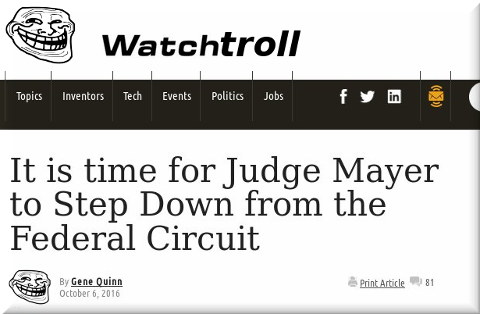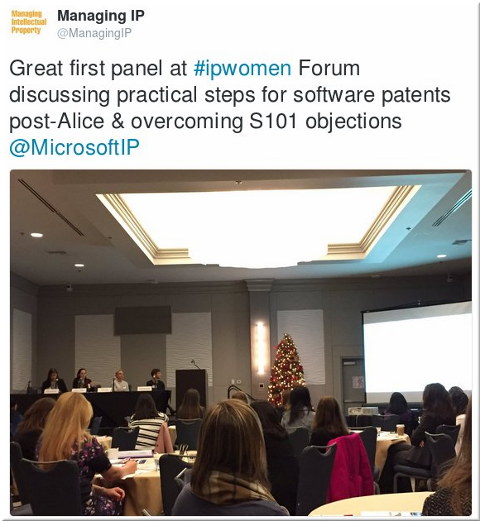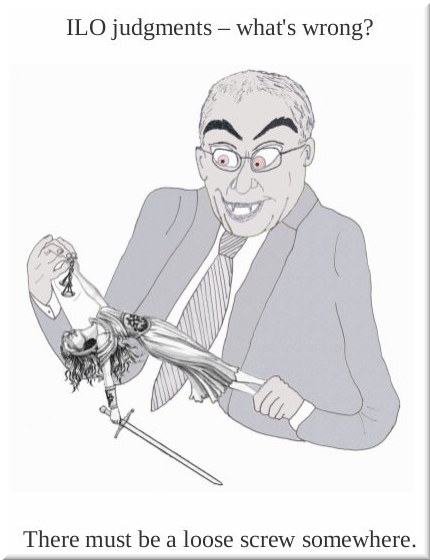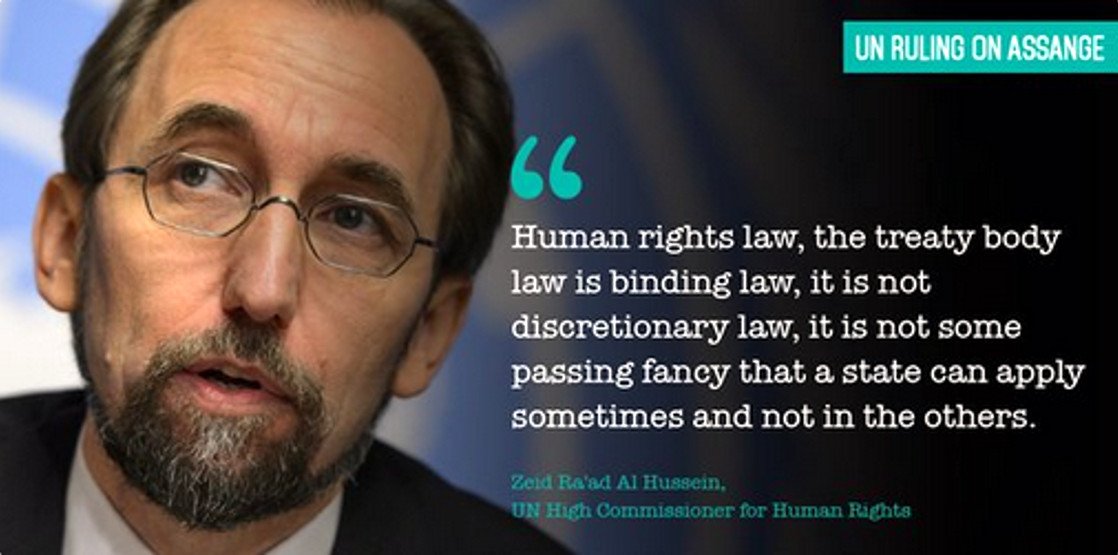01.05.17
Posted in America, Deception, Law, Patents at 6:19 pm by Dr. Roy Schestowitz
Producing nothing, insulting everybody

Summary: A look at some of the latest spin and the latest shaming courtesy of the patent microcosm, which behaves so poorly that one has to wonder if its objective is to alienate everyone
THE patent reform in the US (AIA, especially after Alice) brought us the blessing known as PTAB, which is responsible for the immediate and permanent elimination of many software patents and the reduction in litigation. It lowered confidence in even more of these software patents (potentially hundreds of thousands of patents).
“”Idiotic”, “impotence”… what next? Will Watchtroll accuse judges and PTAB of rape and pedophilia too?”PTAB continues to scare people who made a living from software patents (not software, just patents). With his habitual insults directed at PTAB, Gene Quinn (Watchtroll) continues to fling criticisms at PTAB, bemoaning the latest decision which he summarises with the word “idiotic” in the image (and IBM’s patent chief actually boosts these people, who also attack judges! See the image at the top!).
“Idiotic”, “impotence”… what next? Will Watchtroll accuse judges and PTAB of rape and pedophilia too? Frankly, these people are a lot more rude than anything we have ever seen and some of those people actually advertise themselves as professionals. “If a machine is patent ineligible bc it is an abstract idea,” Watchtroll wrote in Twitter, “no point in keeping powder dry. The 101 fight is now.”
He wants a “fight”.
“Telling Watchtroll about software development is an exercise in futility; he doesn’t even know how software works.”Well, the Section 101 fight is over. The patent microcosm lost. Most software patents are dying and this is good because, as Benjamin Henrion put it in his reply, “patents also destroyed software development.”
Telling Watchtroll about software development is an exercise in futility; he doesn’t even know how software works. I debated this in length with him and then he chickened out, blocking me in Twitter.
Watchtroll (a front for the patent microcosm, not just one person) is now lobbying Trump to makes Patent Chaos Again (as expected, with lots more of this lobbying to come).
“These have included enabling the PTO to attack patent validity in a second window,” says the article, “attacking classes of inventions such as software and medical diagnostics…”
“PTAB is a lot more professional because these financial incentives hardly exist, which makes their staff more objective.”Nobody is “attacking” and there is no “fight”. As we pointed out here before, the attorney known as Patent Buddy uses words like “survive”, “kill” etc. rather than use terms that don’t pertain to war. The people actually call PTAB a “death squad!” Picture that for a connotation.
Here is Patent Buddy saying about the above case: “In the MRI-101 Invalidation Decision, the PTAB Reversed the Examiner finding eligibility under 103, but not 101.”
Examiners at USPTO have historically been rewarded to just award lots of patents, irrespective of quality or prior art (which can take a long time to assemble and study). PTAB is a lot more professional because these financial incentives hardly exist, which makes their staff more objective.
Earlier this week we found this lawyers’ site claiming that “[t]he tide may be turning in the Section 101 landscape and it is making waves in the patent practice area.” No, it’s not. The patent microcosm lives in wonderland and only pays attention to a few CAFC decisions that suit their agenda. The article says that CAFC’s “latest rulings on the issue—Enfish v. Microsoft Corp., BASCOM Global Internet Services v. AT&T Mobility, and McRO v. Bandai Namco Games America—possibly signal a new direction for patent eligibility in a post-Alice era. On the damages front, the U.S. Supreme Court grabbed headlines with its highly anticipated ruling in Samsung Electronics v. Apple, the first design patent case to be examined by the Court in over a century. Our panel of experts discussed these issues as well as patent trends on the horizon in 2017.”
“There’s no “win”, it’s not a game. It’s also not a “war” or a “fight”.”We actually debunked this just recently (December 27th), in relation to similar claims about CAFC cases. Less than a handful of cases (less than one hand’s fingers) don’t change years of patent invalidations, including by Judge Mayer, whom Watchtroll is insulting (see above again).
CAFC is soon going to decide whether challenging low-quality USPTO patents (through PTAB) is acceptable, says MIP, noting about a particular case that CAFC “has granted en banc rehearing in Wi-Fi One v Broadcom. The court will consider whether judicial review is available for a patent owner to challenge the USPTO’s determination that the petitioner satisfied the timeliness requirement governing the filing of IPR petitions” (these are the petitions that typically initiate invalidation by PTAB).
Regarding this new article from lawyers’ media, one person wrote, “CAFC vs. PTAB decision discrepancies: Who wins?”
There’s no “win”, it’s not a game. It’s also not a “war” or a “fight”. In fact, most of the time CAFC agrees with PTAB, so the framing of infighting is simply incorrect and inappropriate. To quote the actual article:
Apple Inc. has won at least a moral victory in a fight with the U.S. Patent and Trademark Office over touchscreen technology.
The U.S. Court of Appeals for the Federal Circuit agreed with Apple on Tuesday that the patent office failed to sufficiently explain why Apple’s method for reconfiguring touchscreen icons is unpatentable due to obviousness.
Apple applied for a patent in 2009 on its method of using a sustained touch to activate an icon, which then allows a person to drag the icon to a new location on the screen. A patent examiner found the claim obvious in light of separate prior inventions on sustained touch and dragging. Combining the two inventions “would be an intuitive way” to rearrange touchscreen icons, the examiner concluded and the Patent Trial and Appeal Board affirmed.
This is just one of those exceptions where the CAFC does not fully agree with PTAB and wants the judgment reassessed.
The bottom line is, things are progressing in a positive direction as the US patent system persists in improving patent quality. It’s well overdue. Here we have a new case which “focuses primarily on §101 issues.”
“The bottom line is, things are progressing in a positive direction as the US patent system persists in improving patent quality.”To quote: “The oral argument of the week is MACROPOINT, LLC v. FOURKITES, INC., No. 2016-1286 (Fed. Cir. Dec. 8, 2016) decided by a Rule 36 judgment.”
Those who claim that Section 101 is losing its potency or that CAFC is at war with PTAB or anything like that are being extremely dishonest and typically — if not always — they are the ones directly profiting from these misconceptions/distortions.
Watchtroll and its ilk need to go away or not be taken seriously. Time after time we have demonstrated that the site’s purpose is to attack those who don’t agree (even judges!) and sometimes to organise 'echo chamber' events so as/in which to lobby officials.
Watchtroll is to the patent world what Trump is to civilised politics. █
Permalink
 Send this to a friend
Send this to a friend
12.26.16
Posted in America, Law, Patents at 4:17 pm by Dr. Roy Schestowitz
Justice nominations for the US Supreme Court (SCOTUS) will play a big role, and some Justices truly worry about Trump

Reference: Trump escalates attack on ‘Mexican’ judge (this ‘Mexican’ judge was born in Indiana actually)
Summary: In light of Trump’s awkward history with judges (e.g. attacking them) one can hope that upcoming patent cases at the highest court won’t be affected by his pro-big corporations agenda
THE PATENT landscape in the US has changed a lot in recent years, especially after AIA (half a decade ago). Software patents, for instance, are a dying breed. This does not mean that things will continue to improve; they can get a lot worse as soon as a new President is inaugurated, to the chagrin and regret of many Americans. Lobbying of Trump has already begun, for instance by the Internet Association (large corporations, not what it sounds) and by IPO. They want the old order of things and they represent a threat to software developers.
AIPLA, another such entity which acts like a think tank (like oil companies in favour of offshore drilling), is telling the USPTO that they want more secrecy. It makes sense for them. As Patently-O put it the other day, “I would say even after/if the USPTO adopts a rule, be very careful if you have patent agents communicating directly with clients, without supervision of a lawyer, because there’s also the possibility that a court won’t follow the Queen’s University case and hold there is no privilege, anyway. That’s already happened in Texas.”
Well, as new articles continue to stress (the latest being, e.g. [1, 2, 3, 4, 5]), Texas may soon end its status as trolls’ capital, but only if SCOTUS rules rationally. This is yet another blow to the ‘old guard’; it represents patent progress and improvements that favour ordinary people, not oligarchs like Trump and a lot of his prospective cabinet members.
We urge people to support groups like the EFF, which growingly mention software patents and openly oppose these. Latest from the EFF’s Daniel Nazer [1, 2] is this article about this month’s “Stupid Patent”, which he explains as follows:
As you head home for the holidays, perhaps passing through a checkpoint or two, take some time to think about U.S. Patent No. 6,888,460, “Advertising trays for security screening.” The owner of this patent, SecurityPoint Holdings, Inc., has sued the United States government for infringement. SecurityPoint recently won a trial on validity [PDF] and the case will now proceed to a damages phase. So, unless the validity decision gets overturned on appeal, we’ll soon be paying tax dollars for the idea of moving trays on carts.
[...]
In a trial before the Court of Federal Claims, the government argued that this claim was obvious because moving trays using carts was well-known in many contexts. The court disagreed. The court suggested that even if using carts to move trays was well-known, the government needed prior art specifically for security checkpoints (arguably the government had such evidence, but the court disagreed on that point too).
In fairness to SecurityPoint, evidence at trial suggested that it had developed a good system for managing trays and carts within the confined space of an airport security checkpoint. But the patent’s claims are far broader than any specific solution. This is something we often see in patent law: someone develops a (fairly narrow) innovation, but then broadly claims it, capturing things that are well-known or banal. This sort of claiming hurts follow-on inventors who develop their own ideas that wouldn’t infringe any narrower claim, and weren’t invented by the patent holder. But because the broader claim is allowed, their own inventions become infringing. Here, claim 1 is not limited to any particular kind of cart, tray, or scanner. The claim really reads on using a couple of carts to move trays and, in our view, should have been found obvious.
Nazer’s colleague at the EFF has meanwhile advised institutions like universities not to give their patents to trolls. They actually mean “patents”, not “inventions” (as the headline puts it). These are not the same thing. “Research funded by the United States government should benefit everyone,” the EFF explains. “That’s why EFF so strongly supports the idea of writing an open access requirement for federally funded research into the law as soon as possible. It’s also one reason why we recently launched Reclaim Invention, a campaign asking U.S. universities to rethink their patenting policies. It’s crucial that federally funded research be made available to the public so that anyone can read and use it, not just people with institutional connections. But even if the public can read government-funded research, patents on inventions that arise from it can still fall into the wrong hands and undermine the public interest.”
Some universities, desperate for cash (especially in periods of privatisation — the Trump way!), are hoping to make a ‘quick buck’ out of patents that the public actually paid for. This is going to become a bigger issue if schools and universities operate more and more like businesses in the coming years, enjoying no status like they did decades or centuries ago. It means that some universities, with staff that receives public grants, will become litigation mills, directly or indirectly (via trolls).
Speaking of desperate appeals for cash, this new article about Chapter 11 Bankruptcy (a process Trump has gone through plenty of times to secure his billions) says that last “week’s corporate news roundup includes the holding by a U.S. federal appeals court that secured indenture noteholders were entitled to a make-whole premium notwithstanding the issuer’s chapter 11 bankruptcy case, the addition by companies in their securities filings with the SEC of risk factors relating to the outcome of the U.S. Presidential election, and the termination by the PTAB of IPR proceedings as to patent claims between Microsoft Corporation and Enfish LLC, resulting in a non-appealable win for Enfish.”
This goes under “TERMINATION OF ENFISH-MICROSOFT INTER PARTES REVIEW PROCEEDINGS IMPLIED AS UNAPPEALABLE AFTER FEDERAL CIRCUIT DECISION AGAINST MICROSOFT” (a case we covered here before).
In our last article we reminded readers that after Enfish the Court of Appeals for the Federal Circuit (CAFC) ruled repeatedly against software patents, including in very high-profile cases. Unless the Supreme Court with some Trump-appointed Justices chooses to reverse Alice (won’t happen any time soon based on the dockets), it is safe to say that political impact on patent law is still just a distant threat. █
“I can’t imagine what this place would be — I can’t imagine what the country would be — with Donald Trump as our president. For the country, it could be four years. For the court, it could be — I don’t even want to contemplate that.” –Justice Ginsburg
Permalink
 Send this to a friend
Send this to a friend
12.15.16
Posted in America, Law, Patents at 8:46 am by Dr. Roy Schestowitz
Litigation scope challenged in TC Heartland v Kraft Food Brands Group (after Alice tackled patent scope).

End of the road for the notorious patent mess that only law firms consistently profited from?
Summary: The US Supreme Court’s Justices may soon put an end to the business model or the modus operandi of patent trolls
AS WE NOTED earlier this week, the US is no longer a good environment in which to be a patent parasite. Watch what happened to Apple after the Supreme Court had intervened (yes, it’s still in the news!), not just to small parasites that are commonly known as patent trolls. It’s rather revealing and the numbers from a new paper of Lemley et al reaffirm the trend.
All those recent SCOTUS decisions with yet more decisions to come (e.g. Lexmark, which is also still in the news, courtesy of John C. Bacoch and William R. Boudreaux from Brinks Gilson & Lione and MIP’s Natalie Rahhal) serve to show that SCOTUS, in its current composition (Justices), is rather intolerant towards patent bullies.
The reforms in the US (regarding patents) seem to be working out and weeding out “Patent Trolls Central”, the Eastern District of Texas (EDTX). Here is how Patently-O has just put it: “Goodbye E.D.Texas as a Major Patent Venue”
The headline may be sensationalist and premature, but here is how Patently-O justifies it:
In a case with the potential to truly shake-up the current state of patent litigation, the Supreme Court has granted certiorari in the patent venue case TC Heartland v. Kraft Food (SCT Docket No. 16-341). An 8-0 reversal of the Federal Circuit is quite likely, although my headline is likely premature.
Michael Loney, writing from New York, has also just covered the subject:
Supreme CourtThe US Supreme Court has granted cert to TC Heartland v Kraft Food Brands Group. The court will review the Federal Circuit law that allows a high concentration of patent cases in one district.
We wrote about this case before and so has the EFF (many times). For the uninitiated, EDTX boasts courts that are intentionally tolerant of plaintiffs, software patents and trolls. That’s how they used to attract ‘business’ or ‘clients’ (parties being sued or suing) and that’s why many patent law firms are based (or relocated to) there. █
Permalink
 Send this to a friend
Send this to a friend
12.06.16
Posted in Europe, Law, Patents at 8:17 am by Dr. Roy Schestowitz
Guess Who is Trying to Retroactively ‘Legalise’ His Own Abuses Now…

Summary: Battistelli turns bad into worse by spitting on the very notion of accepting justice (from the highest court in The Hague or even the UN in this case)
THE system in Europe is often assumed to be vastly superior to many of the world’s systems. We used to take pride in the EPO being so much better than the USPTO and, among many things, rejecting software patents. We cannot say this anymore because Battistelli’s role model these days seems to be SIPO in China (where the quality of patents is about as low as it can get, it’s just an assembly line of papers). Battistelli “is boxing out of the corner now,” one reader told us in relation not only to the social issues but also the technical issues (patent maximalism is a disease that keeps spreading to the EPO). Applicants quickly realise that the value of EPs is sinking. Why would they even bother with pricey new applications, let alone renewals? Many of them won't. They’re gradually waking up to the destruction left behind by Battistelli (rushed examination, brain drain, etc.) and the injustices demonstrated by miscarriage of justice not just against clients [sic] but against hundreds if not thousands of EPO employees (approximately/at least a hundred cases in just 2 years, some impacting multiple employees per case).
“Applicants quickly realise that the value of EPs is sinking.”What the EPO does about this "crisis" (in the Board's own words) is the equivalent of shuffling chairs at the deck of the Titanic. Watch what is showing up in today’s news:
The EPO is expected to refuse to record assignments that do not satisfy the foregoing requirements.
Accordingly, we believe that in the future all assignments should be signed by all parties. Regarding the cases where an assignment has been executed but has not been recorded at the EPO, and where the assignment document was only signed by the assignor(s), you may consider obtaining a second signature from a representative of the assignee acknowledging acceptance of the rights. As another alternative, it might be possible for both parties to sign a “confirmatory assignment” to confirm that an assignment that took place on a date prior to the effective date of these new guidelines.
Given the low quality of patents at the EPO (granted in recent years, not the older ones which have not yet expired), putting more barriers and limitations is the last thing that should be on the agenda. Sooner or later, suggest internal figures, the backlog or pile will have dried up, making the Office underworked and rendering thousands of EPO examiners redundant.
Based on the latest decisions from ILO (or ILO-AT), the Office will also have to spend a lot of time and resources on new ‘trials’. This would involve even more people who otherwise should be carrying out their duties as examiners. Look what a sordid mess Battistelli has created. He should resign, but that alone would not solve all the issues.
“Lacking any sense of shame, Battistelli proposes that the Administrative Council, which was supposed to kick him out years ago, should amend the internal law of the EPO relating to not only the Appeals Committee but also lots of other bodies (including the Disciplinary Committees).”Looking at Battistelli’s appalling reaction to these decisions (leaked here yesterday), the lies are beyond amazing. The guy must be crazy and he’s unable to take responsibility. Instead he’s trying to hold unions whom he’s busting accountable. To him, the fact that there was gross injustice for years is the fault of the Central Staff Committee, which was not nominating representatives for the Appeals Committee. Battistelli has publicly (in the Intranet) accused them of “failure to comply with statutory obligations,” in the same way that he defamed various other people or groups in the Intranet as recently as one month ago (we leaked the example about Mr. Prunier).
Lacking any sense of shame, Battistelli proposes that the Administrative Council, which was supposed to kick him out years ago, should amend the internal law of the EPO relating to not only the Appeals Committee but also lots of other bodies (including the Disciplinary Committees). To quote Battistelli, “if the Central Staff Committee, despite an invitation to do so, fails to make appointments to these bodies, the President shall take appropriate steps to ensure and make the necessary appointments, such as calling for volunteers or drawing lots from among eligible staff members.”
“WIPO looks like very small potatoes in comparison to this.”So basically, Battistelli now tries to ‘legalise’ his own abuses after he committed these abuses. How does that not make Eponia a Banana Republic or rogue state way ahead of even Turkey in 2016? The ‘King’ basically places himself above the law, allegedly buys votes, and refuses to accept a simple judgment even from a UN agency (it’s the only tripartite UN agency). WIPO looks like very small potatoes in comparison to this.
To quote (verbatim) what Judgment 3785 actually said on page 6: “While it is true that the fundamental functions of that body must not be paralysed, it is also true that the body itself cannot be changed through a changed composition. The balance sought to be achieved by the composition of this body, which includes members appointed by the Administration and the staff representation, is a fundamental guarantee of its impartiality. That balanced composition is an essential feature underpinning its existence. Without it, it is not the Appeals Committee.” █
Permalink
 Send this to a friend
Send this to a friend
12.05.16
Posted in GNU/Linux, Law, Microsoft, Patents at 2:47 am by Dr. Roy Schestowitz

Summary: Microsoft’s continued fascination with and participation in the effort to undermine Alice so as to make software patents, which the company uses to blackmail GNU/Linux vendors, widely acceptable and applicable again
OUR longest article yesterday focused on poor advice — either deliberately bad advice or simply influenced by the echo chamber — regarding software patents. The patent microcosm is in growing denial over US courts invalidating software patents granted by the USPTO using Alice, or even patents invalided by PTAB (in much larger numbers).
Some days ago we saw this report from the 2016 International Women’s Leadership Forum, courtesy of patent maximalists.
As can be expected, it was somewhat of an echo chamber not in the gender sense but in the agenda sense. Microsoft was there too and here is the relevant part:
The first practical step, said Julie Kane Akhter of Microsoft, is to learn from cases where the patent has been upheld, such as Enfish, Bascom and Planet Blue.
“In the Enfish patent, for example, they were actually improving the operation of the computer itself,” she stressed. Lessons from the Enfish decision included: the specification was really important; consider identifying the technical problem in the specification; and avoid being too high level in the claims.
She said Enfish provides several practical strategies for applicants: utilise the interview; talk about the technical improvement; and cite Enfish! Lessons from Bascom are: consider discussing prior solutions and their drawbacks; highlight lack of preemption; and keep drafting software applications! And tips from Planet Blue are: argue the examiner has determined the idea in the claims at too high a level; argue the claim is specific enough and improves the technology; and draft claims with realistic scope and technical effect.
For those who forgot or have not been paying attention, Enfish ended up as a pro-software patents caselaw and Microsoft pays David Kappos, former Director of the USPTO, to lobby along those lines. He keeps trying to eliminate Alice (a Supreme Court case) as caselaw. Various patent law firms too still lick their lips over software patents and try to undermine Alice, hoping to ‘rewrite’ it with lower-level cases such as Enfish or Bascom.
On November 30th Dennis Crouch wrote about Microsoft v Enfish (not the other way around), nothing that it “Turns Out the Claims Are Obvious”. This is a PTAB case:
After instituting review, the Patent Trial and Appeal Board found some of the patent claims invalid as anticipated/obvious. On appeal, PTAB factual findings are generally given deference but legal conclusions are reviewed without deference. After reviewing the claim construction and rejections, the Federal Circuit affirmed in a non-precedential decision.
It’s no secret that Microsoft’s software patents are rubbish; their low quality was the subject of many old articles here. Moreover, the company’s selective and hypocritical views on software patents were noted here way back in the i4i days. In another new article by Dennis Crouch he says that “PTAB judges are so well trained in the complexity of technology and patent law,” which is probably something that most patent courts lack.
“It’s no secret that Microsoft’s software patents are rubbish; their low quality was the subject of many old articles here.”Microsoft is still promoting software patents and in the words of MIP: “Great first panel at #ipwomen Forum discussing practical steps for software patents post-Alice & overcoming S101 objections @MicrosoftIP pic.twitter.com/cGWe9qrGPh” (Microsoft hates Linux too, except when it taxes it with patents, in which case it’s more tolerable to “MicrosoftIP”, the troll entity of the corporation). The people who covertly extort and blackmail Linux on behalf of Microsoft — all this while shaping patent law for the company’s bottom line — are also mentioned here. To quote: “It’s the @MicrosoftIP networking break at the #ipwomen Forum. Time to make some new contacts! pic.twitter.com/YwajQuWadV”
To be fair, Microsoft is part of a broader movement here. But it’s role is notable. Microsoft is a key player in this.
The following crossposted article [1, 2], for instance, tries to leave Alice behind. Another crossposted article [1, 2], this one titled “No Abstract Idea Where Invention Cannot be “Practiced in the Abstract”,” is also composed by the patent microcosm and the aim is similar. All the above entities generally wish to restore the patentability of software in the US. Also see the new article titled “The Current State of Computer Software Patentability” (behind paywall). What they all have in common is dissatisfaction with the new status quo — one wherein software is barely patent-eligible, or at least barely defensible in the patent sense in the courts. Patent lawyers pretend to care for inventors, but they just want to undermine Alice to patent software without barriers. See this article of one law firm; what they mean by “weather” does not take into account the risk of one getting sued but the chance of one to obtain a patent. Very one-sided a take, as usual. Software developers should stop patenting software as it’s a waste of time/money, even if such patents can sometimes be granted (only to be lost after a long and expensive legal battles). New PTAB cases on patents, such as this one [1, 2] (on reasonable diligence), remind us that sometimes patents will be invalidated even before they reach the court, i.e. even without the patent holders choosing to assert these offensively. Is is worth the risk? Patent lawyers can brag about “privilege” all they want (see new examples [1, 2]), but all they are after is a universal tax on software, extracted from patents nobody needs or wants. In the case of Free software such as Linux, this tax prevents redistribution, so it is inherently incompatible and antithetical.
“Has CCIA flipped sides again, as it previously did after Microsoft had paid it millions of dollars?”Much to our surprise, Matt Levy (CCIA) has decided to give articles to pro-software patents sites — a departure from his usual tune. He gives false hope to software patents hopefuls like Watchtroll readers and also IAM readers. Has CCIA flipped sides again, as it previously did after Microsoft had paid it millions of dollars? █
Permalink
 Send this to a friend
Send this to a friend
12.01.16
Posted in Europe, Law, Patents at 9:00 pm by Dr. Roy Schestowitz

Summary: Further analysis of the latest rulings from the ILO — decisions that were long expected
THE EPO does not quite respect the principles of the Rule of Law and justice. It’s a mirage or an illusion. We covered it on Thursday, based on the latest ILO decisions.
The “ILO sends European Patent Office Director Battistelli flying,” EPSU which has been involved recently writes about this judgment (in Twitter earlier this evening), as it “Validates complaints [of] staff…”
This links to an article that a handful of EPO insiders told us about. One person said ““every single internal appeal” handled by the Appeals Committee in its current composition from Oct 14 to today legally flawed…”
William New from IP Watch wrote:
The judgments are “remarkable” for several reasons, said the source who wished to remain anonymous.
First, they show that the ILO is trying to clarify formal errors that upset procedures and cause major problems, said the source. In addition, both express criticism of the current EPO president, the source said.
Judgment No 3796 clarifies that “every single internal appeal” handled by the Appeals Committee in its current composition – from October 2014 to today – is legally flawed, the source said. That means that many cases will have to be dealt with again, after a new internal appeals system is created, the source said. To fix the flaw, the president will have to ask the CSC to nominate members for the committee, but because two members of the Appeals Committee have been demoted after disciplinary procedures were launched against them by the administration, the CSC has refused to act. “The ILO judgment puts pressure on” Battistelli to make concessions to the CSC, the source added.
In addition, under Judgment No. 3785, complaints by several hundred staff members against the new career system will have to be revisited, and those judgments will be delayed. Both decisions will likely figure into the 14-15 December AC meeting “since they show that employees’ justice is currently denied at the Office,” the source noted.
All of this is “bad for the reputation and credibility” of the European patent system, said the source. It’s also bad for the image of responsible governments such as France, the Netherlands and Germany, so “there will be a lot of pressure on the delegations to finally fix some issues.”
The latest fictional diary from the EPO is based on the above. Many people are likely to speak about this for quite some time to come. █
Permalink
 Send this to a friend
Send this to a friend
11.14.16
Posted in Europe, Law, Patents at 1:29 am by Dr. Roy Schestowitz
De facto martial law under King Battistelli (like Erdoğan in Turkey)



Summary: The EPO has quickly descended into a police state, but the supervisors of Battistelli (national delegates) have thwarted or at least postponed his incredible pursuit of imposition by the highest-ranking governor (himself) on everyone, effectively removing all power from the previous executive, legislative, and judicial branches of the EPO (Organisation), under the pretense that this is necessary for the Office to function effectively (e.g., to maintain order and security, or to provide core services)
SOMEONE recently leaked to us an opinion on the Investigation and Disciplinary Guidelines [PDF, 17MB] (or disciplinary and investigation guidelines) proposed for Battistelli’s chinchillas (the Administrative Council, or AC for short) to pass to him on a silver platter, probably for continued persecution of perceived ‘enemies’ and union-busting activities. We saw some portions of discussions about it, in particular after this failed to pass (the chinchillas found some backbone for a change). “A Game Changer” is what one person called it (alluding to the UK delegation which expressed its feeling that this could be a “game changer”), but it wasn’t long before Battistelli resumed union-busting activities, in defiance of the chinchillas’ opposition (he doesn’t care what they say, he just does whatever he wants anyway). “It seems that as the result of a coordinated effort by the AC delegates, both the Investigation and Disciplinary guidelines proposed by the EPO have been removed from the AC agenda,” said one person. There’s some background to all this, namely “the somewhat unfruitful discussion in the Board 28,” which is definitely aware of the crisis at the EPO*.
“Curiously, based on what we learned, Battistelli grossly violated/ignored what was decided on because “in clear terms delegates insisted that no decision should be taken on presently running disciplinary procedures until the new procedure is put in place!””As a result of this rejection (Battistelli not getting what he demanded), the opinion will be taken into account and the proposals revised for next month’s meeting. There seems to be growing interest in improving protections for staff representatives and union leaders. Has the coin finally dropped? Is the AC realising that Battistelli is totally out of control?
Curiously, based on what we learned, Battistelli grossly violated/ignored what was decided on because “in clear terms delegates insisted that no decision should be taken on presently running disciplinary procedures until the new procedure is put in place!”
Well, Battistelli fired a staff representative regardless. What a mockery to the AC. The tyrant is so insecure that he doesn’t care what the rules say. Delegates from Switzerland, France, Britain and the Netherlands in particular got snubbed by Battistelli. Isn’t it time for them to fire him already?
“Delegates from Switzerland, France, Britain and the Netherlands in particular got snubbed by Battistelli.”As staff representatives explicitly put it, “there is no specific safeguard for Staff representatives or Union officials in disciplinary procedures, especially when the complaints are filed directly by the President or a high official [like Bergot] acting under his authority.”
In relation to the person whom Battistelli brutally fired this month, representatives wrote at the time that he had been “downgraded in Jan 2016 (against the recommendation of the Disciplinary Committee). In fact, the Office has launched investigation and disciplinary procedures against several other Staff representatives as well, affecting negatively their health.”
EPO workers are also citizens of European nations. Their human rights cannot simply be disregarded when they visit Eponia**. █
_________
* The summary results of the 75th Board 28 meeting said that “The new proposals were welcomed, but nevertheless no common understanding could be reached on the right to remain silent and on other issues. The President had strong reservations on this issue, insisting on the necessity to ensure an efficient procedure to fight fraud and harassment, and reserved the possibility to withdraw the package from the agenda.”
** Incidentally, later today Julian Assange will have his rights revisited and his lawyers currently (overnight) spread around this image (copied below).

Permalink
 Send this to a friend
Send this to a friend
11.07.16
Posted in Law, Microsoft, Patents at 12:55 pm by Dr. Roy Schestowitz
Sweeping changes continue to sweep up the patent mess in the USPTO

Summary: News about Microsoft’s love of [patents against] Linux, the persistent issue of patent maximalists guiding US patent law, and an update regarding the Patent Trial and Appeal Board (PTAB) that cleans up the mess left by these aforementioned actors
SOFTWARE PATENTS have always been our primary focus, since the site began exactly 10 years ago.
“I’m not talking about software patents, whose disappearance I would welcome,” said the author of this new article titled “The End of Intellectual Property?”
Patent practitioners must understand that in order for their profession to maintain legitimacy (positive public perception) they need to ensure that patents are granted only on things where patenting can be justified, economically in particular. Not every thing in existence should be patented. That’s just common sense, as authors who studied the effects of monopolies explained in scholarly work for decades if not centuries. Patent law — like copyright law — must examine/study the broader effects, including the externalities.
Today’s article is a mix of news found and collected over the past week. We present the news in no special order.
Microsoft Still Evil and Dangerous
Microsoft is lobbying against Alice (and for software patents, as usual). How do we know? This report from last week reminds us that Microsoft is a nasty, malicious company that intends to continue to sue rivals using software patents. To quote: “As Microsoft’s Micky Minhas sees it, Alice may be dissuading IP owners from other countries from patenting their products here, placing the US at a disadvantage. As China considers accepting patents for business methods, the US is heading “in the opposite direction,” he said.”
Does that mean that China’s patent system is getting better? No, it’s getting worse and patent trolling has gotten a foothold there, as we so often/habitually noted this year. Looking at what Microsoft actually continues to do, consider this new and timely article titled “No, Microsoft does not love open source” (published by the corporate media about a week ago). To quote the key part:
I used to follow Microsoft’s intellectual property Twitter account in order to see exactly how much Microsoft loved open source as it bragged about all the people it had coerced into signing patent agreements. I guess someone realized that crowing about that was not a great idea, because today the feed tweets puff pieces about how great software patents are and how they drive innovation (through litigation).
The truth is that Microsoft’s principal open source strategy hasn’t changed and probably never will. The point of open source to Microsoft (or any other company) is to give you an on-ramp to its platform. For Microsoft, that platform is morphing from Windows to Azure, so of course Microsoft has dialed back its rhetoric toward Linux. If you read Microsoft hates Linux, then you probably won’t host your VMs on Azure — same deal if you have a choice between two virtual private clouds. Duh, Microsoft loves Linux … on Azure. Why wouldn’t it?
Microsoft may even be willing to accept open source that’s tied to its technologies, but not directly to its platform. Generally these will be “children’s edition” versions like .Net Core. I’m not saying Visual Studio for Linux isn’t progress, but is anyone really itching to run .Net on Linux? I mean, after the outrageous commercial success of Mono (/sarcasm), are any of you going, “Woo-hoo, I want to write .Net code and run it on Linux”? Bueller? Bueller? Anyone?
Now, about those lawsuits — Microsoft likes it both ways: Embrace on one hand, and get tidy patent settlements on the other. People who work at Microsoft say it’s a big company, and as with all big companies, the left hand doesn’t know what the right hand is doing. Actually, that would be dismal management — if “we love open source” was really part of Microsoft’s strategy.
As evidence that Microsoft loves open source and Linux, last year Microsoft noted some long-running lawsuits that it wasn’t really winning and dropped them. Repositioning “we cut our losses” to “because we love you” is good PR. Respect! But let’s talk about real change.
For those who think that Microsoft has changed, be sure to check if media coverage changed rather than Microsoft itself. We wrote quite a few articles this year about new instances of Microsoft blackmail using patents, targeting companies which distribute Linux devices.
Patents That Harm Society
There is a new paper (more than a fortnight old by now, which in academic terms/by academic standards is very little) that focuses on patent litigation. Litigation is rarely indicative of success; rather, litigation is invoked when there is a failure and when parties fail to agree about patents. Who benefits from all this the most? Patent lawyers of course, at both sides (offensive and defensive). Here we have a new report about a patent lawsuit against solar panel company . Earth Solar Power, a Chinese solar panel company, got sued. Does the environment benefit from it? Certainly not. What does public interest say about all this? Also see this report about Octane. “Ninth Circuit’s en banc ruling says a case in which fee-shifting is appropriate is “simply one that stands out from others with respect to the substantive strength of a party’s litigating position”,” to quote MIP. Where does the public stand on this? Whose fees are “shifting” and who pays the price for all these lawsuits? Here is another new MIP article, this one speaking about a lawsuit with a decision composed by Justice Ginsberg. It’s not a new case, but here’s what MIP says:
In 2014, the US Supreme Court heard Petrella v Metro-Goldwyn-Mayer, which asked the same question of copyright law. In a majority opinion written by Justice Ginsberg, the Court decided that laches should not be an available defense in copyright infringement cases. The Court has recently shown a tendency to want to maintain consistency across the branches of IP law. In this case the Justices will have to interpret whether the statute creates a statute of limitation for damages in patent infringement cases, or if this is not established, whether laches are needed to effect this limitation upon suit delays.
Baby products are not improving because of lawsuits like this (see context in this article) and certainly society loses a lot. Maybe the problem is that too many patents are being granted in too many domains.
Tastelessly enough (in our view), Professor Crouch now uses his student Zachary Kasnetz to criticise a decision he doesn’t seem to approve of. Crouch is part of that crowd (or the insulated choir) that wants us that believe that more patents mean more success, more innovation, or whatever. His blog is usually quite informative (with detailed graphs and everything), but he is clearly subjective and he has become a symptom of a patent system led and steered by maximalists, not moderates. Some of them have become so greedy that they burn down the system and alienate the public. No wonder the connotation with patents among many members of the public isn’t quite so positive. Many now find “patents” synonymous with “trolls” rather than light bulbs, innovation, etc.
Here is a new article where Crouch shows the proportion of abandoned patent applications in the US going down over time. Is this indicative of a patent quality problem? Remember that the real number is FAR higher than what's shown by Crouch, around 92% if one considers revisions and re-applications. Here is another Crouch article about “USPTO Allowance Rate” and further commentary about it (“What is the Steady-State Patent Allowance Rate?”). In recent years, based on these figures, the USPTO got ever more terrible at rejecting bogus patents. David Kappos as Director (now lobbyist) made things ever more dire.
Courts Meet Avalanche of Bogus Patents
The USPTO has created a mess. It certainty did, but it profited from it. It’s obvious at whose expense and to whose gain. The incompetence (top-down, management instructing examiners) now overloads the PTAB staff and leads to a sort of ‘scatterback’ that falls back on courts. Only lawyers and trolls win here.
How did it all happen and what does the USPTO plan to do about it now? Well, based on Patently-O (Crouch’s blog), the “USPTO Proposed to Revise Rule 56″. David says in this article, while linking to a PDF, that the “announcement is here. I will be submitting comments before the 12/27 deadline, and so if you have any ideas or thoughts, please post away.”
So basically policy is being shaped by those who profit from it. We don’t expect public interest groups to have anything to say. Here is the nasty Watchtroll pushing his own agenda with this article about a “new memorandum on software eligibility”. Want to guess what Watchtroll will tell them?
Here is Watchtroll bemoaning the CAFC for smashing about 90% of software patent cases that it deals with. These people just can’t help themselves. Whenever the system tries to correct itself they panic and try to keep it ruined, as from ruin comes more business to them (consulting, applications, litigation etc.) and it’s frustrating to think that the public pays the price for all this unproductive chaos. The public pays, these people pocket it all.
The mess created by the USPTO, which granted patents on software for a number of decades (because it got greedy), scatters back on CAFC now. We see a growing number of reports about it. Kyle Bass, a person whom patent maximalists like to hate, goes on a PTAB winning streak ahead of the winter break. By invalidating crappy patents (granted by USPTO in error) he actually makes money. While opportunistic and selfish, at least it helps keep applicants honest (out of fear). Here is how MIP put it the other day. “The Coalition for Affordable Drugs has notched a flurry of PTAB wins in the past two weeks. The next decisions will not come until the new year,” Michael Loney wrote.
Drugs being more affordable is a good thing, right?
Here is another new update about PTAB, courtesy of Mr. Loney:
The past four months have been stable for Patent Trial and Appeal Board filings, while October saw the Federal Circuit giving another ruling on reviewability of IPR institution in Medtronic, the PTAB issue Kyle Bass and printed publication decisions, and the USPTO propose fee increases and changes to patent agent privilege
The monthly numbers of Patent Trial and Appeal Board (PTAB) petitions filed for the past four months have been within a 14-petition range, after displaying volatility at the start of the year.
There is no sign of stopping at PTAB and we are gratified to know that those who attack PTAB (Watchtroll for example) are not succeeding. In another report from MIP it’s stated that the “Federal Circuit [is] falling behind as PTAB appeals stack up,” confirming what we saw other sources claim. IAM ‘magazine’, in the mean time, has a new “Report” (usually paid) which shows that CAFC further limits patent scope (not just impacting software but also logic circuit designs) and it leaves us very hopeful. Is this combination of CAFC and PTAB, inheriting the ‘genes’ of the SCOTUS, going to make software patents a thing of the past everywhere? It’s definitely an attainable future. We’re partly there already.
What got a lot of this reform rolling was the America Invents Act (AIA), which brought PTAB just a few years before Alice. According to Patently-O,”AIA Patents [are] Approaching 50% of newly issued patents” and here is what they mean by AIA Patents:
By the end of the calendar year, most newly issued US utility patents will be considered “AIA Patents.” AIA-patents are examined under the first-to-file rules of the America Invents Act of 2011 and are also subject to potential post-grant-review proceedings. The chart below shows results from a random sample of 7,300 recently issued patents.
Soon enough there might not be many software patents left (not already expired) and Alice/Section 101 accomplished more than just software patents abolition, based on this report about industrial machines. It seems too good to be true, but it’s true. This is why patent law firms are hopping mad.
The US patent system is still messy, but we are optimistic and we believe it’s getting better; most developments these days are positive ones. █
Permalink
 Send this to a friend
Send this to a friend
« Previous entries Next Page » Next Page »




























 Content is available under CC-BY-SA
Content is available under CC-BY-SA